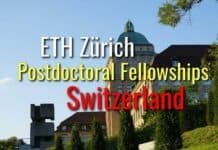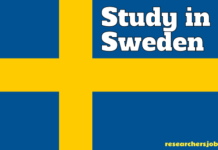PhD Opportunities in Computing: Explore exciting PhD opportunities at the School of Computing, focusing on hardware of telecommunications, computer networks, games technology, electronic engineering, and software engineering. Engage in cutting-edge research areas such as machine learning, evolutionary computation, multi-agent systems, knowledge engineering, cyber-physical systems, digital media technology, and data analytics and AI.
Designation: PhD Candidate
Research Area:
- Machine Learning
- Evolutionary Computation
- Multi-Agent Systems
- Knowledge Engineering
- Cyber Physical Systems
- Digital Media Technology
- Data Analytics and AI
- Project Title: Automated Sustainable Investing Decision Making Using Advanced Data Science Techniques for Enhanced Financial Sustainability
- Project Title: Towards 6G and Beyond intelligent and multifunctional networks: From forward-looking visions to implementable applications
- Project Title: Investigating the impact of Blockchain technology on the Relational Database infrastructure to improve key business operations such as Supply Chain Management and Logistics
- Project Title: Design and Evaluation of Mobile Interfaces adapted to Task Performance Strategies of Older Adults Living with Dementia
- Project Title: Green Video Streaming: Intelligent Climate-Friendly Video Delivery System
- Project Title: HearingXR: Accessible AR/VR for d/Deaf and Hard-of-Hearing Users
- Project Title: Machine Learning Method for Automatic Segmentation of Shoulder MR images for generating 3D printed Models
- Project Title: PSE Patients Shared Experiences: Capturing the effectiveness of medical treatment by analysing Patient Discourse on Online Healthcare Forums
- Project Title: Real-Time Interpolation of Impulse Responses in Dynamic Virtual Environments
- Project Title: Developing an Open Smart Computable Biomedical Knowledge Repository
- Project Title: Smart Building Process Connectivity (SBPC): Enhancing Operational Efficiency through Data-Driven Algorithms
- Project Title: Investigating the Use of Digital Cultural Heritage in Changing Perceptions
Location: School of Computing, Birmingham City University
Eligibility/Qualification:
- Formal applications should be made using the University’s online application form.
- Applicants should hold a Bachelor’s or Master’s degree in a relevant field.
- An initial research proposal of 1,000 – 2,500 words is required.
- Curriculum vitae (CV) must be submitted along with the application.
Job Description: PhD candidates will be involved in innovative research in various computing domains, including machine learning, digital media technology, and cyber-physical systems. The School of Computing encourages applicants to discuss their research ideas with individual staff or the Director of Research Degrees, Professor Mark Josephs, before submitting a formal application. Successful candidates will be part of the vibrant research community and contribute to advancements in computing technologies.
How to Apply: To apply, complete the project proposal form, quoting the project reference, and submit the online application. Ensure the proposal (1,000 – 2,500 words) is uploaded as a PDF document, accompanied by a curriculum vitae. Two references, with at least one being an academic reference, and qualification certificates (Bachelor/Master’s) and transcripts must also be uploaded.
For application process inquiries, contact the CEBE Doctoral Research College at DRC.CEBE@bcu.ac.uk.
Application Closing Date: 23:59 on Sunday 14 January 2024 for a May 2024 Start.
Shortlisting and Interview Dates: Monday 15 January 2024 – Wednesday 31 January 2024.
Disclaimer: This job post is sourced from a reliable publication. However, applicants are strongly advised to verify details and obtain further information from the official website of Birmingham City University’s School of Computing.
- 🎓 Areas of Interest in School
- Hardware of telecommunications, computer networks, games technology, electronic engineering, and software engineering.
- Research areas include gaming, e-business, home automation, learning technologies, intelligent systems, security, forensics, robotics, and cloud computing.
- 🤖 Research Focus Areas
- Machine Learning
- Evolutionary Computation
- Multi-Agent Systems
- Knowledge Engineering
- 📝 PhD Application Process
- Apply using the University’s online form under the ‘How to Apply’ tab on the Computing PhD course page.
- Include a 1,000-2,500 words research proposal and a CV.
- Contact CEBE Doctoral Research College for application process inquiries.
- 💰 Computing Studentships
- Fully funded 36-month PhD Studentships available.
- Stipend of £18,622 per year and Full-Time Home Fee Scholarship of £4,712.
- Application closing date: January 14, 2024.
- 🤖 Project: Automated Sustainable Investing
- Objective 1: Review automated decision-making in finance, focusing on sustainable investing and data science.
- Objective 2: Collect financial and non-financial data for ESG-related risks and opportunities.
- Objective 3: Use non-financial data for financial decision-making supporting global environmental sustainability.
- Objective 4: Apply machine learning and natural language processing for automated sustainable investments.
- 🌐 Project: 6G and Beyond Intelligent Networks
- Develop multifunctional networks for 6G cellular communication.
- Integrating RF sensing, network intelligence, and cybersecurity.
- Create proof-of-concept prototype with 5G and Beyond communications hardware.
- 🧱 Project: Blockchain Impact on Relational Databases
- Investigate blockchain’s impact on relational databases for Supply Chain Management and Logistics.
- Aim to develop more efficient, secure, and compliant relational database architectures.
- 🧠 Project: Mobile Interfaces for Dementia
- Optimize mobile interfaces for older adults with dementia.
- Investigate changes in GUI interactions over time.
- Develop adaptive interfaces based on individual task performance.
- 🌍 Project: Green Video Streaming
- Address the environmental impact of video streaming.
- Develop an intelligent climate-friendly video delivery system.
- Focus on reducing carbon emissions in the Film and TV industry.- 🌐 The examination of energy efficiency in video streaming is crucial for sustainable technologies.
- 📺 Adaptive video streaming by major providers like BBC, Netflix leads to high energy consumption.
- ⚖️ Balancing video quality and encoding/decoding complexity is a challenge for the codec community.
- 🌍 The project focuses on energy-efficient video streaming, addressing carbon footprint across servers, networks, and user devices.
- 📈 By 2025, digital technologies may contribute to 8% of Greenhouse Gas Emissions; project aligns with climate commitments.
- 📊 Project objectives include energy-aware transcoding, adaptive bitrate streaming, and analyzing user engagement.
- 🎓 Ideal candidate for the project has a Bachelor’s/Master’s degree, programming experience, and research/industry exposure.
- 👂 Project Title: HearingXR: Accessible AR/VR for d/Deaf and Hard-of-Hearing Users
- 📡 AR/VR devices lack accessibility for d/Deaf and hard-of-hearing users; audio-centric applications pose challenges.
- 🔍 PhD project aims to understand user requirements, conduct experiments, and design accessible AR/VR features.
- 🧩 Objective: Develop AR/VR plugin with accessible features based on user needs for inclusive AR/VR applications.
- 🎓 Candidate should have a background in relevant fields, strong Unity/Unreal Engine skills, and an interest in user-centric design.
- 🖨️ Project Title: Machine Learning Method for Automatic Segmentation of Shoulder MR images for generating 3D printed Models
- 💉 Shoulder conditions pose challenges; MR imaging and 3D printing offer innovative solutions.
- 🤖 ML used to automate MR image segmentation for personalized 3D printed shoulder models.
- 🎯 Objectives: Develop ML model, optimize hyperparameters, and convert segmented images to STL for 3D printing.
- 📚 Research contributes to improved pre-operative planning, surgeon confidence, and patient satisfaction.
- 📱 Project Title: PSE Patients Shared Experiences: Capturing the effectiveness of medical treatment by analyzing Patient Discourse on Online Healthcare Forums
- 🏥 Rise in chronic conditions necessitates better patient information; online forums provide valuable insights.
- 🤖 NLP techniques applied to analyze patient forums; project aims to improve accuracy and precision.
- 📊 Multi-label classification model predicted for sentimental values in medical discussions.
- 👩🔬 Ideal candidate should have a strong academic background, programming skills, and a keen interest in healthcare and NLP.
- 🎮 Project Title: Real-Time Interpolation of Impulse Responses in Dynamic Virtual Environments
- 🎧 Project aims to enhance audio transitions in virtual environments for immersive experiences.
- 🌐 Seamless adjustment of audio based on surroundings; collaboration between computer science, audio engineering, and HCI.
- 🧠 Anticipated findings include a novel neural network-based framework for real-time audio interpolation in dynamic 3D scenes.
- 🕹️ Impact on gaming, simulations, training scenarios, architectural walkthroughs, and virtual reality therapies.
- 🌐 Developing an Open Smart Computable Biomedical Knowledge Repository
- 🎓 Essential Qualifications:
- BSc/MSc in Computer Science, Audio Engineering, or related field.
- Strong programming skills (C++, Python, or similar).
- Experience in digital signal processing or acoustics.
- Demonstrable interest in virtual environments and audio technology.
- 🌟 Desirable Skills:
- Prior research experience or publications.
- Knowledge of real-time audio processing.
- Experience with virtual reality or game development platforms (e.g., Unity, Unreal Engine).
- 🧠 Personal Attributes:
- Analytical mindset.
- Creative problem-solving skills.
- Excellent communication and teamwork abilities.
- Self-motivated and capable of independent research.
- 🎓 Essential Qualifications:
- 🏢 Smart Building Process Connectivity (SBPC): Enhancing Operational Efficiency through Data-Driven Algorithms
- 🎓 Person Specification:
- Seeking a motivated candidate with a master’s in computing.
- Strong analytical skills and effective communication.
- Proficiency in simulation tools (e.g., Simulink, Network Simulator 2) is desirable.
- 🌐 Anticipated Findings:
- Improved process connectivity model for smart buildings.
- Development of novel data-driven algorithms for operational optimization and predictive maintenance.
- Evaluation of system performance and efficiency in smart buildings.
- 🎓 Person Specification:
- 🕵️ Investigating the Use of Digital Cultural Heritage in Changing Perceptions
- 🎓 Essential Qualifications:
- Bachelor’s or Master’s degree in Computer Science, User Experience Design, Digital Humanities, or related field.
- Strong skills in extended reality, game engine authoring toolsets, digital media, web technologies, or interactive systems.
- Interest in cultural heritage, digital preservation, and societal impact.
- 🌟 Desirable Skills:
- Experience in digital storytelling or interactive media design.
- Background in social sciences or humanities research.
- Knowledge of UX/UI design principles.
- 🧠 Personal Attributes:
- Creative thinker with a passion for cultural heritage.
- Excellent communication and collaborative skills.
- Ability to work independently and conduct interdisciplinary research.
- 🎓 Essential Qualifications:







